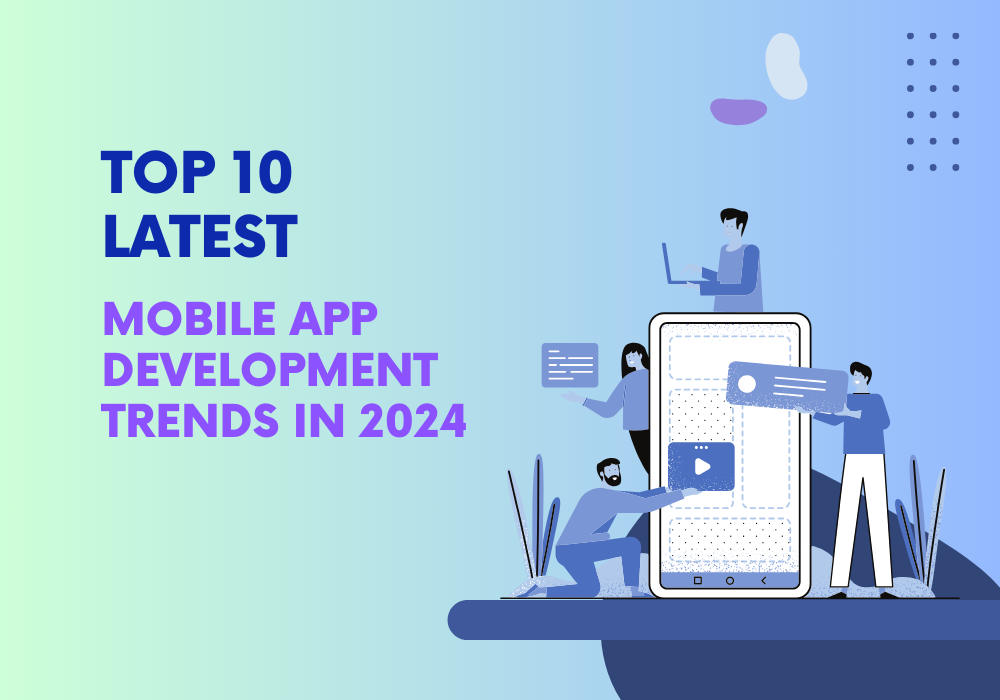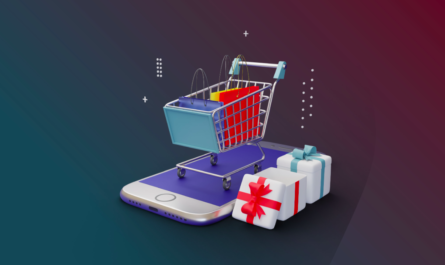Mobile app development was never as simplified before as it is today. Thanks to advanced frameworks, new programming languages, platforms, and emerging technologies.
A feature-rich mobile app can open the floodgates of opportunities for businesses to offer highly personalized user experiences to their audiences.
A recent report published by Statista reveals that the total revenue generated from mobile apps will reach $673.80 billion by 2027.
This is why entrepreneurs and even small-scale businesses hire mobile app development service providers to build future-ready apps to help write their growth stories.

Mobile app development is a constantly evolving and dynamic landscape. Developers must stay updated with the latest mobile app development trends, new technologies, and other crucial methodologies to build next-gen, user-centric mobile apps.
As we have entered 2024, let’s discuss some fresh and emerging mobile app development trends that will dominate the market in the upcoming years.
Contents
- 1 1. AI-Based Personalization
- 2 2. Cross-Platform App Development
- 3 3. More Emphasis On Cybersecurity
- 4 4. Voice-Enabled Applications
- 5 5. Blockchain-Powered Decentralized Apps
- 6 6. Robotic Process Automation (RPA)
- 7 7. 5G is Here to Stay
- 8 8. Super Apps Will Dominate
- 9 9. Advancements in AR & VR Technologies
- 10 10. Wearable Devices
- 11 Conclusion
1. AI-Based Personalization
Personalization can help get a competitive edge in a cut-throat competition. A report suggests that 36% of customers expect to get personalized experiences.
Another report from Epsilon reveals that 80% of consumers would purchase from a brand that offers customized experiences.
Finding your customers’ preferences can help you offer personalized products and services. Customized products or services also help build long-term loyal relationships with your customers.
Technologies like Artificial Intelligence and Machine Learning can help you achieve this goal. AI-based tools, machine learning algorithms, neural networks, and recommendation engines can help you gain a good level of personalization in your products and services.
AI can help find what your users expect from your products or services. With highly advanced AI engines and Machine Learning algorithms, you can get highly accurate data about user interests, personas, preferences, usage patterns, history, etc.
With such valuable data insights at your side, you can easily make data-centric decisions that can help skyrocket your ROI and offer a fruitful user experience.
AI and ML technologies also can help you while designing your app. You can use data-driven design decisions based on user inputs and buyer personas.
We will see an unprecedented rise in AI investments globally in the upcoming years. A report suggests that the AI market will reach $738.80 billion by 2030.
Startups and entrepreneurs will rely heavily on AI models and develop AI-based applications that offer an immersive user experience and engage users instantly. You can hire an AI App development company Dubai to build highly immersive and data-driven AI-powered mobile apps to provide highly personalized features and services to your users.
Some use cases of AI-based apps are
- Smart search options in Google and Amazon.
- Personalized content recommendations on Netflix and Amazon
- Image and voice recognition in Google Lens
- Fraud detection in financial institutions
- NLP for chatbots
- Medical diagnosis and advanced healthcare systems
- Virtual assistants to perform and automate day-to-day tasks
- Process automation in manufacturing facilities.
2. Cross-Platform App Development
Developing a mobile app, especially a native app, is costly. For example, if you want to build a native Android and iOS app, you have to hire two separate teams of developers to create apps. In addition to that, native app development takes too much time. Entrepreneurs and startups with possible budget constraints find it challenging to invest so heavily in native mobile apps.
Thanks to cross-platform frameworks like React Native and Flutter, they can develop cross-platform apps that can be built using a single codebase and offer a native-like performance and speed. Also, cross-platform app development can be built quickly and does not cost much.
Frameworks like React Native also allow developers to build hybrid apps, like web applications and PWAs. You can utilize the extra funds for other valuable things while having an app that offers the best user experience.
All you need to do is hire a React Native or Flutter app development company and tell them your requirements. Apart from these two frameworks, some notable frameworks, like Xamarin, PhoneGap, Ionic, etc., are equally good at building cross-platform apps. Also, various tools, libraries, third-party APIs, and widgets help build superior cross-platform apps.
Cross-platform app development offers various benefits to developers and businesses, like
- Streamlined development processes and workflows,
- Cost and time-effective solutions to build advanced mobile apps
- Offers consistent user experience across all iOS and Android devices,
- Mitigates errors and delivers high-quality mobile apps,
- Native-like user experience with the look and feel of native apps
- Easy to integrate emerging technologies like AR, VR, AI, ML, IoT, etc.
3. More Emphasis On Cybersecurity
Security is the prime concern for businesses as it might endanger the company’s reputation. Recently, we have seen malware attacks on reputed companies like Uber, HSBC Bank, Slack, and Twilio.
Various studies suggest that 44% of companies face such application breaches, which is concerning. People who share their sensitive data with you expect data confidentiality from you. When security attacks happen, you might lose their trust and loyalty.
A study reveals that 84% of consumers want better fraud protection from businesses.
Also, in light of various cybersecurity and data security regulatory frameworks like GDPR, CCPA, and HIPPA, you must adhere to their data guidelines and regulatory suggestions. Non-compliance might expose you to legal issues and penalties.
While developing the mobile app, discuss the security concern with your team and how to overcome security vulnerabilities. From implementing security measures to testing the app thoroughly to detect any issues, there is a long way to go to ensure that your app is free of errors and security issues.
4. Voice-Enabled Applications
Voice-enabled and speech-recognition apps are increasing everywhere around us. You can easily book your movie tickets or place an order using a voice command. Not only that, you can also control your home electric appliances with voice commands.
The global voice-enabled app market will generate revenues of $55.07 billion by 2030.
You can get a competitive edge over your rivals by incorporating voice command and speech recognition features in an app. You can perfectly redefine how your users interact with the app. Combining features and technologies like natural language processing and voice recognition can offer your audience a seamless and highly interactive user experience.
Also, businesses can mix voice-enabled apps with IoT technologies to help users control their electronic devices and appliances effortlessly.
5. Blockchain-Powered Decentralized Apps
Blockchain is the perfect technology to address security-related concerns in mobile apps. Blockchain-powered decentralized mobile apps can offer transparency in transactions with a tamper-resistant distributed ledger.
In addition to that, once someone has entered data into the system, this data cannot be altered, offering a high account of fairness and transparency.
Blockchain-based DApps can be used in various industries, such as financial institutions, enterprises, government and public institutions, and blockchain platforms.
6. Robotic Process Automation (RPA)
Robotic Process Automation through mobile apps can help businesses automate various processes, mitigate man-made errors, and improve productivity and efficiency.
The primary thing is to automate regular, repetitive tasks. A mobile app based on algorithms performs various repetitive tasks, like tracking inventories, billing processes, managing purchase orders, etc.
RPA is not limited to the manufacturing sector but can also be helpful in other departments like human resources, customer service, retail, insurance, logistics & transportation, etc.
7. 5G is Here to Stay
The 5G technology will open the doors of possibilities and opportunities for businesses. It will connect more people and increase productivity and efficiency through faster internet connection and mobile apps.
Mobile apps will also be able to handle a large amount of data, and developers will be able to build highly innovative and interactive mobile apps.
Consumers can perform tasks like shopping and accessing information faster and more smoothly.
8. Super Apps Will Dominate
Super apps are mobile apps that can serve multiple purposes simultaneously within a single platform. They are becoming popular and will dominate the upcoming future. Users need to download one app to perform various tasks, and it will improve efficiency and productivity.
Some examples of super apps are WeChat, Gojek, Rappi, GOTO, Tata Neu, Alipay, etc. It will also help businesses offer users a streamlined experience with highly superior mobile apps with advanced features and functionalities.
9. Advancements in AR & VR Technologies
Do you have a gaming app on your smartphone? There is a high possibility that it has AR or VR features, shaping the whole immersive journey. Augmented Reality and Virtual Reality can change the landscape of mobile app development.
An AR or VR-based app primarily offers users a highly immersive and superior user experience. It also improves engagement and captivates users with highly intuitive features and functionalities.
For example, Metaverse, a Facebook initiative, helps users to transcend into a virtual world where they can shop, play, and perform various tasks. You will find the rise of AR/VR apps that can offer users immersive user experiences and enthralling journeys.
10. Wearable Devices
You must have heard of Apple Watches that can help track your fitness and health. This watch can be handled through a mobile app and help access your crucial health vitals.
Such wearable devices will likely witness a rise in the upcoming days. Today, we have fitness bands, activity trackers, and smartwatches that can help track health and offer crucial information.
We will indeed witness a massive surge in the development of wearable devices and mobile apps to manage them. The growth is steady and will increase in the future. We have just started to scratch the surface with wearable devices and their integration into mobile apps. The future seems highly promising.
Conclusion
The ever-evolving mobile app development landscape has massive promises to offer in 2024 and beyond. Developers will dig their way to new possibilities and opportunities to improve user experience, build highly innovative features, and improve performance and speed.
We have discussed the top ten emerging mobile app development trends that will dominate the market in 2024. Suppose you have an app idea in mind. In that case, you need to hire a mobile app development service provider with a team of experienced developers to build an app that can align with your business objectives and scalability goals.




